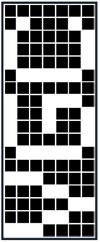Two things: first, how come no matter what time period or level of technological advancement, the hero always uses a sword, and no one ever gives them funny looks? I mean come on, in Final Fantasy VII, Cloud was running around a metropolis with a sword that was about the same size as him and nobody called the cops. In Final Fantasy VIII, you had an 18-year-old walking around the capital city with not just a sword, but a gun blade tucked into his belt and the soldiers never stopped him and confiscated his weapon. I’m convinced that half the time, the evil king or emperor or dictator or president or god or omnipotent being is brought down by crappy homeland security. Who did these guys contract their security out to, anyway? FEMA?
My second item is, how come swords always do way more damage than guns? I’ve got a .32 caliber revolver that could put a hole through someone’s head, but it’s much more effective to hack at them with the family sword that hasn’t been sharpened since dad died using it to defend the homestead. I’m still waiting for the RPG where it’s the gun, not the pen, that’s mightier than the sword.
Rogue Galaxy isn’t that RPG, but it’s better than most. Rouge Galaxy was made by Level 5, who did a large chunk of the work on Dragon Quest VIII. Thus, the two games share very similar graphical style; however, Rogue Galaxy leans more towards the rendered look rather than the fuller cell shading that Dragon Quest VIII uses. Even though Dragon Quest VIII came to America first, Level 5 actually made Rogue Galaxy first. The similarities between the two games’ style is apparent in the overall look and feel of the environments and character designs. Even though Rogue Galaxy came out a couple of years ago, it was revamped for its American release, with the addition of some new weapons and items and a new planet to explore.
The story starts with a whole bunch of clichés: orphan boy who wants adventure, monster attack, mistaken identity, pirates and then it jumps off in a whole new direction. Basically the main character, Jaster Rogue, has lived his whole life on the desert planet Rosa. He wants to explore the galaxy, but the planet is currently under occupation and its inhabitants are not allowed to leave. One day, a monster attacks Jaster’s hometown and he fights it off with the aid of a mysterious stranger, and a couple of space pirates mistake him for a legendary hunter, whom they were seeking to recruit.
This is where the clichés end and an interesting twist begins: the pirates’ goal is to find the legendary lost planet of Eden, a planet with unlimited resources, so they can strip it bare and become fabulously wealthy. Your opposition is the biggest company in the galaxy and its president, who is currently trying to make the current interplanetary war last as long as possible, so he can make as much profit as possible. He’s also looking for Eden for the same reason as you: money. However, he has a lot more resources to expand. Finding the lost planet involves finding ancient ruins and unlocking the secrets of a lost civilization.
One place where Rogue Galaxy excels is the use of secondary characters. Most of the time in games, the characters that join you are usually used to develop the main character’s character. By helping those people solve their problems, the main character expands upon itself. In Rogue Galaxy, all of the secondary characters that join you have fully developed personalities and backgrounds that last longer than the half an hour it takes to sort through their problem and get them to join you. Every character has their own reason for being involved beyond the usual “paying back the person who helped them.”
The Battle system is another place where Rogue Galaxy shines. Rogue Galaxy uses an active battle system. Battles take place on the same screen as all the other action, yet unlike other games, where you can see the monsters before they reach you, battles happen randomly. Since you can’t control all your characters at once, Rogue Galaxy handles your allies’ AI in an ingenious way. When a character wants to use one of their abilities or an item, rather than just going ahead and doing it, they make a “suggestion.” Usually they make two suggestions at once and you can either OK one of them or ignore them. This prevents your other characters from wasting items and action points.
The active battles keep you alert, the cut scenes are of decent length and manage to move the story along without taking away from play time (unlike Xenosaga, in which there was a cut scene every time you did anything at all) and there are enough characters to make party selection interesting without being overwhelming (Chrono Cross had a little more than 40 different characters who could join you).
The only issue I have with Rogue Galaxy is that the maps are very linear. You have no choice but to go from point A to point B and you really can’t get lost in between. I’m already a fan of the game, but if they make a sequel, a more open world design is something I would hope they keep in mind. My verdict: buy or rent a copy. What else are you going to do over spring break? Write an essay? Yeah, right.





















































